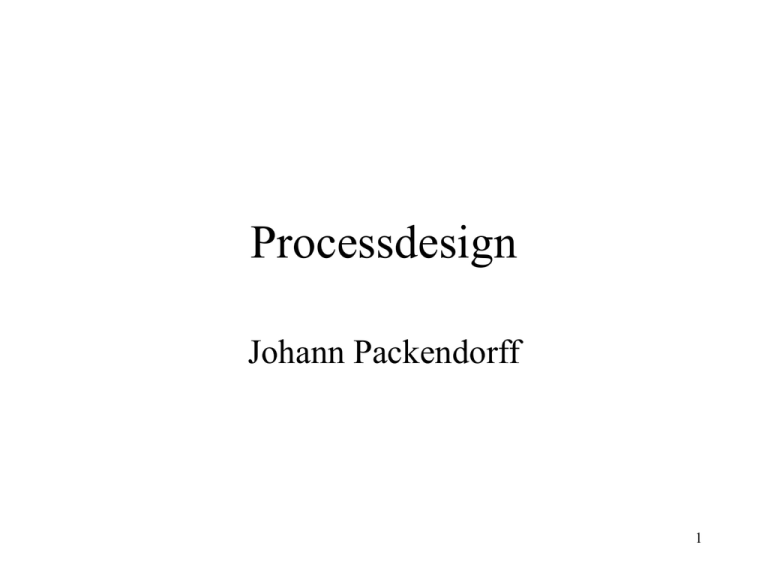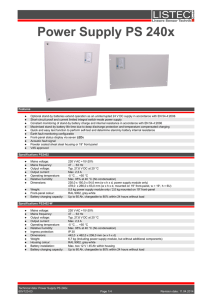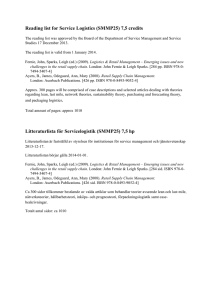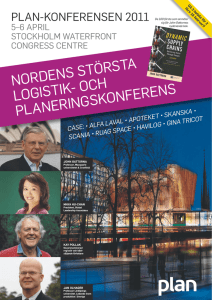Processes that Design Products and Services
advertisement

Processdesign Johann Packendorff 1 Process Design = att designa både designaktiviteter och produktionsaktiviteter! Process design Processes that Design Products and Services Processes that Produce Products and Services Supply Network Design Concept Generation Screening Layout and Flow Preliminary Design Evaluation and Improvement Process Technology Job Design Prototyping and final design 2 Designing the Product or Service Products and services should be designed in such a way that they can be created effectively Designing the Processes that Produce the Product or Service Processes should be designed so they can create all products and services which the operation is likely to introduce Decisions taken during the design of the product or service will have an impact on the process that produces them and vice versa 3 Finished designs which are: TRANSFORMED RESOURCES Technical information Market information Time information INPUTS THE DESIGN OUTPUT ACTIVITY High quality: Error-free designs which fulfil their purpose in an effective and creative way Speedily produced: Designs which have moved from concept to detailed specification in a short time Dependably delivered: Designs which are delivered when promised Test and design equipment Design and technical staff Produced flexibly: Designs which include the latest ideas to emerge during the process TRANSFORMING RESOURCES Low cost: Designs produced without consuming excessive resources 4 Relatively early in the design activity the decisions taken will commit the operation to costs which will be incurred later 100% Percentage of final product cost committed by the design Percentage of design costs incurred 0% Start of the design activity Finish of the design activity 5 Processdesign • Började med Scientific Management och Fords löpande band • Konkret utformning av tillverkningsprocessen – syftar till förbättringar av kvalitet, hastighet, tillförlitlighet, flexibilitet och kostnadsläge • ”Processorientering” - att organisera hela företaget ’längs’ processerna i stället för kring funktioner eller specialistavdelningar 6 Processdesign - teman Processdesign 1: Detaljutformning av operationer (job design) Processdesign 2: Volym/varians-förhållandet och val av processform Processdesign 3: Supply network design 7 Processdesign 1: Detaljutformning av operationer (Job design) 8 Process design Processes that Design Products and Services Processes that Produce Products and Services Supply Network Design Concept Generation Screening Layout and Flow Preliminary Design Evaluation and Improvement Process Technology Job Design Prototyping and final design 9 Operation (an activity that directly adds value) Beginning or end of process Inspection (a check of some sort) Activity Transport (a movement of some thing) Input or Output from the process Delay (a wait, e.g. for materials) Direction of flow Storage (deliberate storage, as opposed to a delay) Decision (exercising discretion) Process mapping symbols derived from “Scientific Management” Process mapping symbols derived from Systems Analysis 10 Raw Materials Assembly Stored Sandwiches Move to Outlets Stored Sandwiches Sell Take Payment Standard sandwich process Customer Request Raw Materials Assembly Take Payment Customer Request Customized sandwich old process 11 The operation of making and selling customized sandwiches Prepare Sandwich materials and customers Bread and Base filling Assemble whole sandwich Assemble as required Take payment Customers “assembled” to sandwiches The outline process of making and selling customized sandwiches Use standard “base”? No Yes Fillings Customer Request Assemble from standard “base” The detailed process of assembling customized sandwiches Stored “Bases” 12 Customized sandwich new process Assemble whole sandwich Assembly of “sandwich bases” Use standard “base”? Take Payment No Fillings Yes Bread and Base filling Customer Request Stored “Bases” Assemble from standard “base” 13 ‘Two handed’ process chart Left hand Wait Right hand Pick up base plate Insert into fixture Hold base plate Pick up two supports Locate back plate Pick up screws Locate screws Pick up air driver Fasten screws Wait Replace air driver Pick up centre assembly Inspect centre assembly Hold centre assembly Locate and fix Switch on timer Wait to end test Inspect Transfer grasp Wait Inspect Transfer grasp Put aside 14 Processdesign 2: Volym/varians-förhållandet styr valet av processform (process technology / layout & flow) 15 MowRock 16 Manufacturing: Different process types are appropriate for different Volume-Variety combinations Low High Volume High Project Jobbing Batch Variety Mass Continuous Low 17 Deviating from the ‘natural’ diagonal on the product-process matrix has consequences for cost and flexibility Manufacturing operations process types Variety None Project Jobbing Batch Mass Continuous Service operations process types Volume Less process flexibility than is needed so high cost More process flexibility than is needed so high cost Professional service Service Shop Mass service None The ‘natural’ line of fit of process to volume/variety characteristics 18 Project Processes • One-off, complex, large scale, high work content “products” • Specially made, every one customized • Defined start and finish: time, quality and cost objectives • Many different skills have to be coordinated • Fixed position layout, resources brought to product 19 Jobbing Processes • Very small quantities: “one-offs”, or only a few required • Specially made. High variety, low repetition. “Strangers” • Skill requirements are usually very broad • Skilled jobber, or team of jobbers complete whole product • Fixed position or process layout (routing decided by jobbers) 20 Batch Processes • Higher volumes and lower variety than for jobbing • Standard products, repeating demand. But can make specials • Specialized, narrower skills • Set-ups (changeovers) at each stage of production • Process or cellular layout, predetermined planned routing 21 Mass (Line) Processes • • • • Higher volumes than Batch Standard, repeat products (“runners”) Low and/or narrow skills No set-ups, or almost instantaneous ones • Cell or product layout: a fixed sequence of operations 22 Continuous Process • Extremely high volumes and low variety: often single product • Standard, repeat products (“runners”) • Highly capital-intensive and automated • Few changeovers required • Difficult and expensive to start and stop the process • Product layout: usually flow along conveyors or pipes 23 Processdesign 3: Vad vill vi att andra företag skall utföra i produktionsprocessen? (supply network design) 24 Traditionell logistiksyn 25 Traditionellt logistikflöde 26 27 Supply Chain Management • Process design involves designing not only processes internal to the company • Designing related processes that take place in other companies is also an issue for operations managers • The company is in fact a part of a wider network • In the network of companies, meta-processes must be designed (supply chains) 28 Advantages of taking a network perspective Location of the operation Vertical integration How much of the network should the operation seek to own? Where should the operation be located? Taking a network perspective helps businesses address the three key network design decisions. Balance of capacity How should capacity be managed in the long-term? 29 Total and Immediate Supply Networks “Second tier” Suppliers “First tier” Suppliers “First tier” Customers “Second tier” Customers The Operation Supply side of the network The Immediate Supply Network Demand side of the network The Total Supply Network Internal Supply Networks 30 Firms in the same industry may configure their supply networks in different ways Corp. Market COMPAQ Home Office Market Suppliers Retailers Corp. Market DELL Home Office Market Retailers Suppliers 31 Operations performance should be seen as a whole supply chain issue Benefits of looking at the whole supply chain include Puts the operation into its competitive context Helps to identify the key players Shifts emphasis to the long term Sensitizes the operation to macro changes 32 Direction, extent and balance of vertical integration Should excess capacity be used to supply other companies? Raw material suppliers Component maker Assembly operation Wholesaler Retailer Narrow process span Wide process span Upstream vertical integration Downstream vertical integration 33 The location of operations Supply-side factors Operation Demand-side factors Labour costs Labour skills Land costs Suitability of site Energy costs Image Transportation costs Convenience for customers Community factors 34 Outsourcing decisions affect • • • • • Quality Speed Dependability Flexibility Costs 35 Relative Costs in a “Do vs Buy” Decision In-source opportunity Out-source indirect supplier profit “allocated” direct market price coordination risk coordination coordination risk risk Buyer Costs 36



